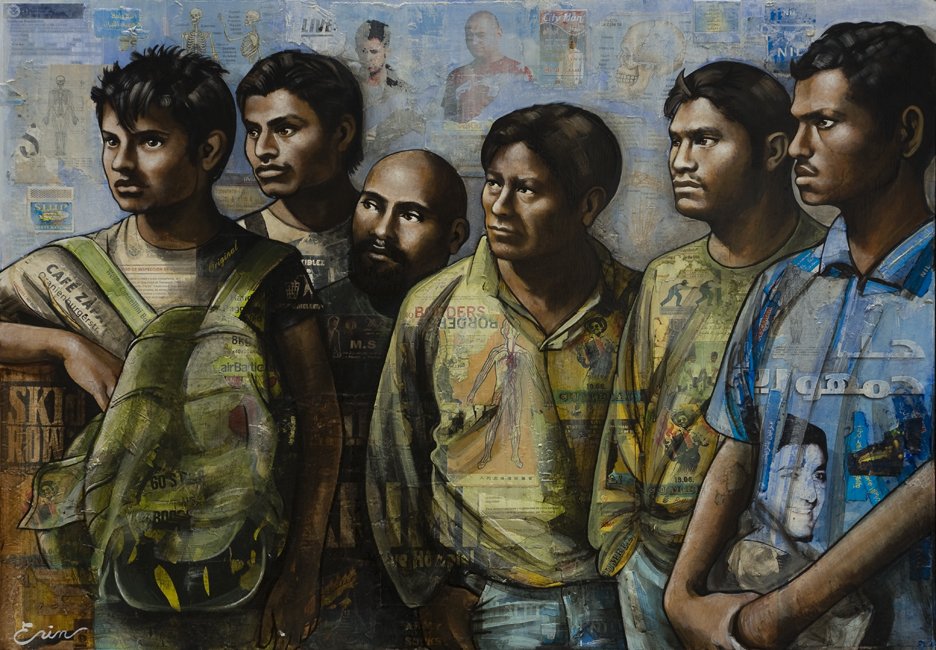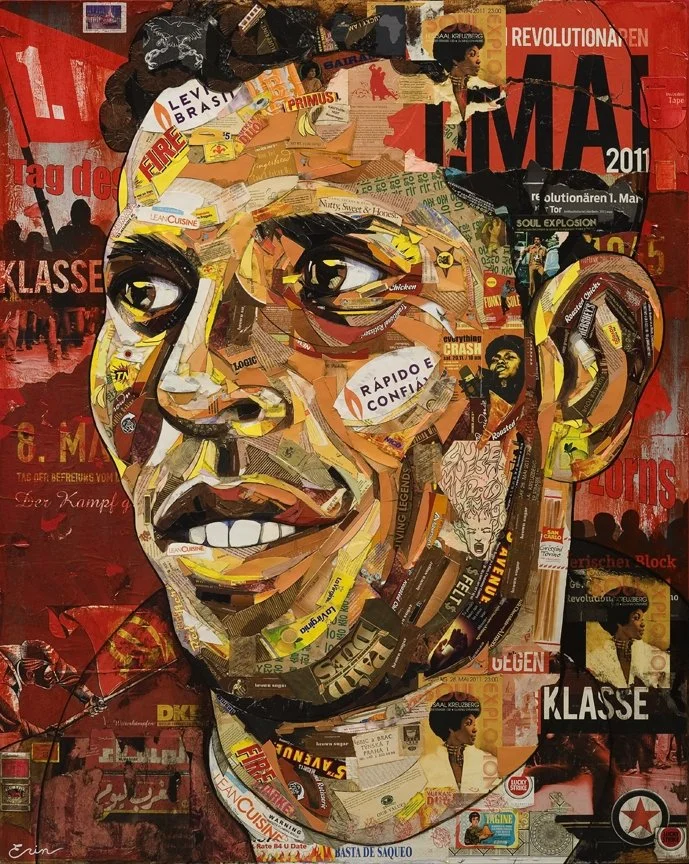Seven Miles Per Second 2011
Egypt 55" x 40" Private Collection
Volver 60" x 48" Private Collection
Leila: Bathroom Attendant at the Sphinx 40" x 28" Private Collection
Roberto Bolano 31" x 16" Private Collection
Uighurs in Bermuda 24" x 36" Private Collection
Nogales 28" x 40" Private Collection
Lampedusa 28" x 40" Private Collection
Santo Toribio Romo 36" x 24" Private Collection
Lupita Perez Montes Private Collection
Sally Zahran 8" x 6" Private Collection
Self Portrait 2011 36" x 24" Private Collection
My Grandmother with her first Greatgrandaughter 40" x 28" Private Collection
Ai Wei Wei: Art is the Solution 72" x 60" Private Collection
Maricela Ortiz 31" x 16" Private Collection
Mohammed Bouazizi 60" x 48" Private Collection
Seven Miles Per Second 2011
Works by Erin Currier | Acrylic and mixed media on panel
Well over a half a century ago, Herbert Marcuse foresaw a time when the possibilities of advanced industrial societies; the development of productive forces of a global scale, the extension of the conquest of nature, the growing satisfaction of needs for a growing number of people, and the creation of new needs and faculties; would be realized through means which would cancel their liberating potential. Indeed, globalized production has ushered in an era in which Mexico imports 90% of its corn; Brazil devours its own rainforests to provide for its material prosperity; the U.S.A. drains its own aquifers in the service of “fracking” natural gas deposits; and farmers from Iowa to India and Indonesia are persecuted for saving and planting their own seeds. This, combined with the fact that entire economies are now dependent upon corruption, unceasing crisis, and war, creates a set of circumstances and conditions that make survival impossible for growing numbers of people.
The artist David Wojnarowicz quipped, “The minimum speed required to break through the earth’s gravitational pull is seven miles per second -we would have to run awful fast to escape from where we are heading.” This speed of defiance is an apt analogy of the minimum amount of effort necessary for emancipation from the catastrophic effects inherent in the violence of globalization, capitalism, fundamentalism, and ecological decay -exactly the amount of energy exerted daily by a growing number of refugees. They are the migrants that cross treacherous seas in flimsy, over-crowded rafts, and who cross perilous deserts without adequate food or water, only to be detained or deported upon arrival. They are the immigrants who traverse the barren void of the bureaucracy of exclusion in the Global North, where subjugator and subjugated struggle in the defense of mass consumption. They are the redundant masses who exist without recourse to justice or representation, the unemployed and unemployable, of whom, Marcuse claimed, “exist outside the democratic process.”
Seven Miles per Second examines the chance that gravity can be defied. The invisible background of systemic violence engendered by the speculative dance of capital, which pursues its ruthless course through dozens of resource-rich countries now supplying China, America, the EU, and Russia with cheap materials and even-cheaper labor, has produced the catastrophic consequence of a desperate global exodus. In a superego blackmail of gigantic proportions, developed countries “help” the undeveloped with aid, credits, and economic exploitation in the guise of charity and austerity, hiding behind a humanitarian mask their complicity and co-responsibility for the miserable conditions of human beings, who, if they are lucky enough, find a way to escape. To re-establish balance to the situation, a kind of re-distribution of truth needs to be applied to the destructive logic of resentment, brutal repression, and self-denial. As Marcuse stated, “The life (of those outside the democratic process) is the most immediate and the most real need for ending intolerable conditions and institutions. Thus, their opposition is revolutionary even if their consciousness is not. Their opposition hits the system from without and is therefore not deflected by the system; it is an elementary force which violates the rules of the game, and, in doing so, reveals it as a rigged game.”
Seven Miles per Second examines the chance that, however small, the most advanced consciousness of humanity and its most exploited force will meet again.
















